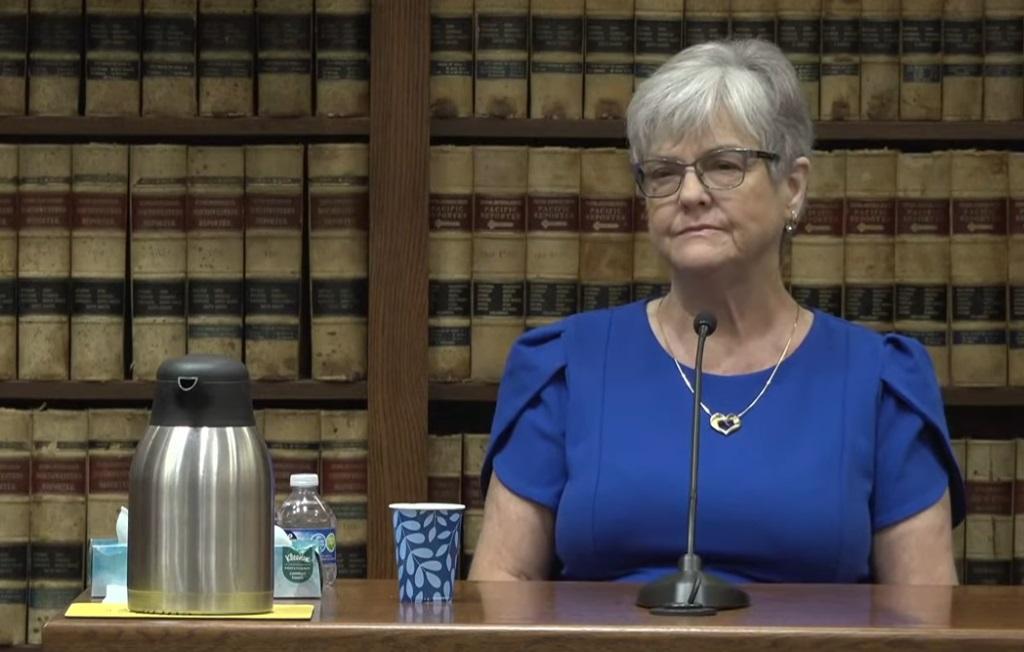
CPR is covering each day of the Peters' trial. You can read our explainer of the case here, and catch up on past days here.
Tina Peters was worried early on that election material being posted online could put her in legal jeopardy, according to Belinda Knisley, her former chief deputy clerk who testified in court Tuesday.
“‘I’m f—ed,’” Knisley recalled the clerk telling her, using an obscenity that suggests trouble. “Those were her words and I said, ‘what do you mean?’ And she said, ‘it's on the internet, it was not supposed to be, and it's out there.’ And I had no idea what she was talking about, but those were her words.”
Knisley testified to her conversations with Peters about the fallout that occurred after images of Mesa County voting systems were found online, leading up to the 10 criminal charges she now faces. Knisley agreed to testify against Peters as a part of a plea agreement she reached on charges related to the case.
Peters is accused of misleading public officials and other crimes while concealing the identity of a man she allowed to access Mesa County voting equipment around a 2021 software update. In her testimony, Knisley spoke about helping Peters obtain a security badge for Gerald Wood, which she learned would be used by another man, Conan Hayes, a retired surfer tied to election integrity conspiracies. During that update, photos — including of passwords — were taken that were later posted online. That, Knisley said, is when Peters got nervous.
“The disk or drive that she had sent to him — being (Hayes), I now know — had been published by someone and it was up at the symposium and that she was going to have to answer for it,” Knisley said, adding that in multiple occasions afterward Peters told her she was afraid she would be going to jail.
Knisley also told the jury that she purchased a disposable phone at the suggestion of Peters as well as downloading a messaging app and obtaining a new email address.
“She directed me to go to Walmart and to use cash and to buy myself and (fellow employee) Sandy (Brown) a disposable phone and to use it to call her, to contact her and her attorneys,” Kinsley said.
“Did the defendant tell you why she thought you would need a disposable phone to contact her?” prosecuting attorney Janet Drake asked.
“She did not want anything to be on my personal phone or the county phone that could be used against me or them or whomever,” Knisley said.
Drake asked Knisley to clarify that she had pleaded guilty to related charges and had agreed to testify for the prosecution. She also asked if Knisley had changed her opinion on Peters’ actions.
“I believe actions taken after the fact, and the lying, is what’s caused her to be in trouble,” Knisley said.
On cross examination, defense attorney Michael Edminster asked Knisley about her diagnosis of Hashimoto’s disease, an autoimmune disorder. Knisley explained that the disease affected her ability to remember specific words, but that it did not affect her overall memory of events.
Edminster also asked Knisley about protocols for protecting past election data and her role in the clerk's office. He asked Knisley if she shared concerns about election security and Peters’ efforts to allegedly preserve election data.
Edminister followed up on questions from the prosecution on whether or not Knisley had believed there was voting occurring from people who were not eligible to do so. Knisley referred to her earlier comments to Drake, where she said “I was very concerned, not having had any other involvement with elections up until I had that position.”
- Tina Peters Trial Day 1 — Attorneys deliver contrasting narratives of former Mesa County Clerk’s handling of election equipment
- Tina Peters Trial Day 2 — The former Mesa County Clerk heard blasting the Secretary of State’s Office in recording
- Tina Peters Trial Day 3 — Man at core of identity theft allegations tells his story
- Three years after being accused of tampering with voting machines, former Mesa County Clerk Tina Peters heads to trial
- Potential jurors screened ahead of former Mesa Clerk Tina Peters’ election security breach trial








